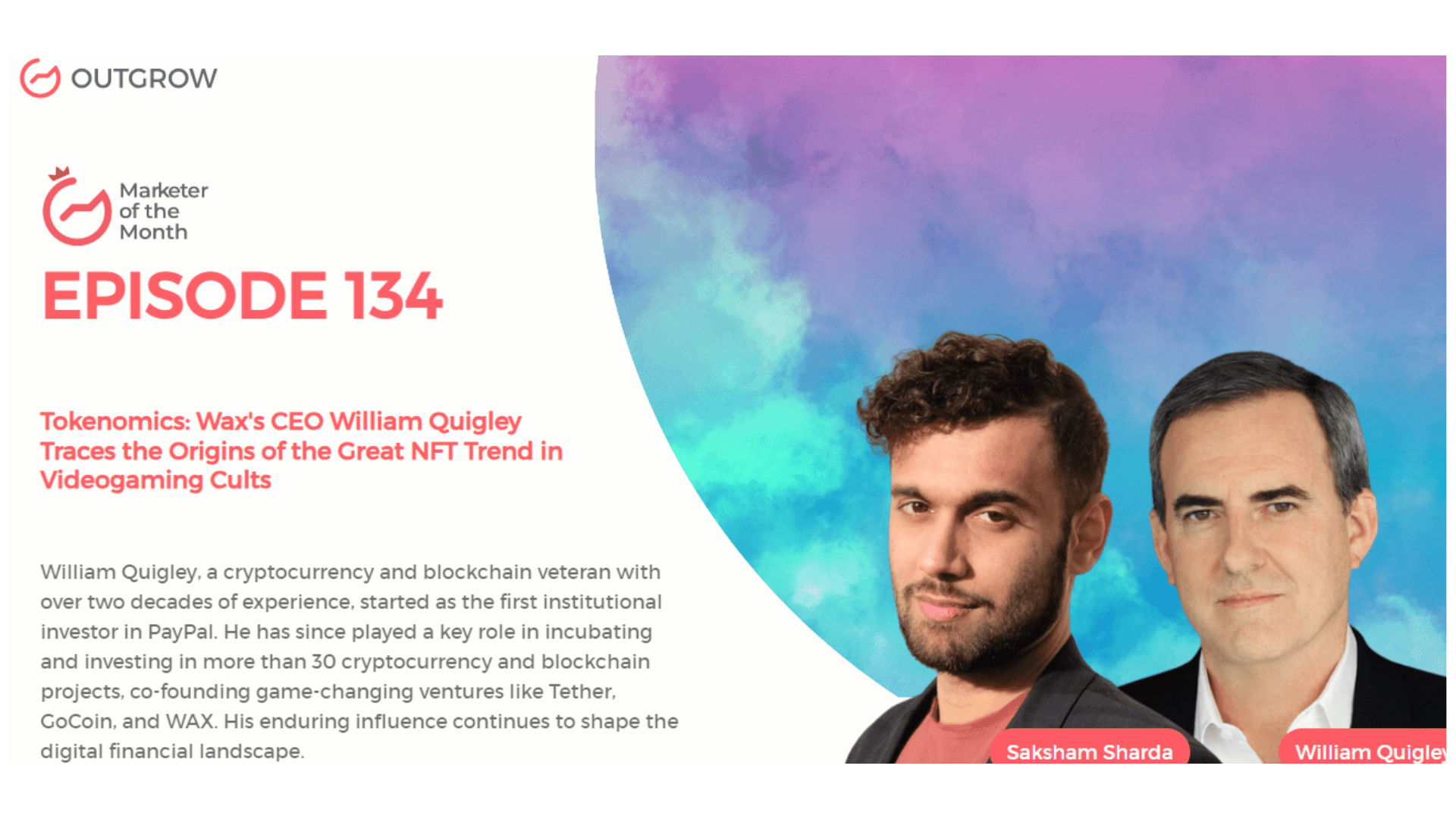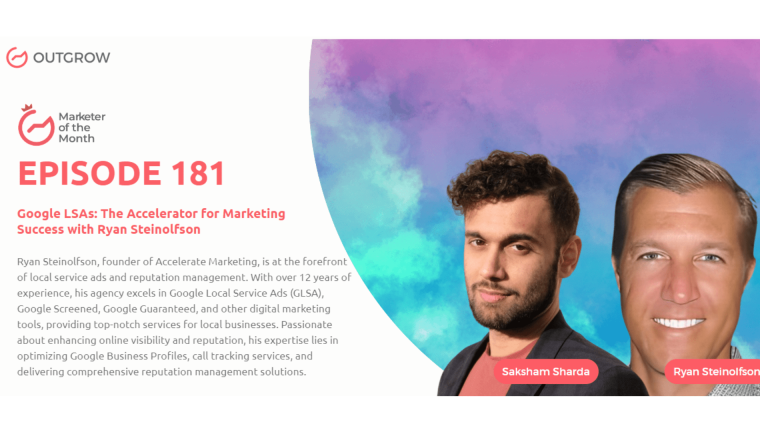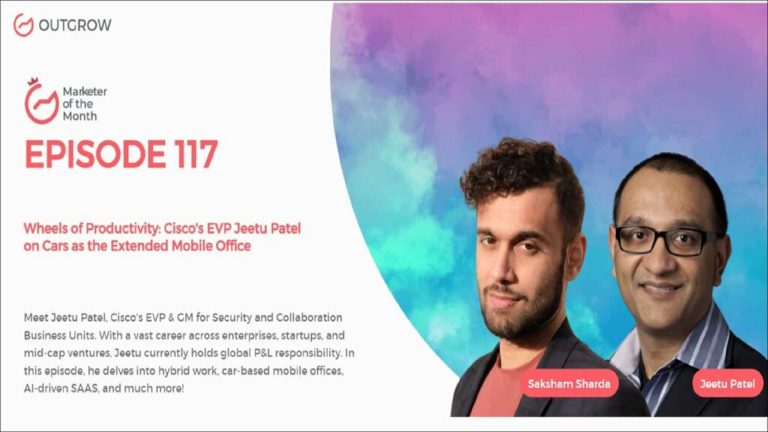EPISODE 134: Marketer of the Month Podcast with William Quigley
Table of Contents
Hey there! Welcome to the Marketer Of The Month blog!
We recently interviewed William Quigley for our monthly podcast – ‘Marketer of the Month’! We had some amazing insightful conversations with William and here’s what we discussed about-
1. Demand for NFTs in gaming.
2. How the initial NFT craze was driven by novelty in digital ownership.
3. Video games as drivers of internet tech advancements.
4. Augmented and virtual reality’s impact on gaming.
5. Environmental concerns regarding NFTs.
6. NFTs shifting towards utility, potential industry impact.
About our host:
Dr. Saksham Sharda is the Chief Information Officer at Outgrow.co. He specializes in data collection, analysis, filtering, and transfer by means of widgets and applets. Interactive, cultural, and trending widgets designed by him have been featured on TrendHunter, Alibaba, ProductHunt, New York Marketing Association, FactoryBerlin, Digimarcon Silicon Valley, and at The European Affiliate Summit.
About our guest:
William Quigley, a cryptocurrency and blockchain veteran with over two decades of experience, started as the first institutional investor in PayPal. He has since played a key role in incubating and investing in more than 30 cryptocurrency and blockchain projects, co-founding game-changing ventures like Tether, GoCoin, and WAX. His enduring influence continues to shape the digital financial landscape.
Tokenomics: Wax’s CEO William Quigley Traces the Origins of the Great NFT Trend in Videogaming Cults
The Intro!
Saksham Sharda: Hi, everyone. Welcome to another episode of Outgrow’s Marketer of the Month. I’m your host, Dr. Saksham Sharda, and I’m the creative director at Outgrow. co. And for this month we are going to interview William Quigley, who is the CEO at Wax.
William Quigley: Great to be here. Thank you.
Don’t have time to read? No problem, just watch the Podcast!
Or you can just listen to it on Spotify!
The Rapid Fire Round!
Saksham Sharda: Describe what your organization does in one sentence.
William Quigley: We build blockchains and blockchain applications including video games built on blockchains and for people who like video game virtual items.
Saksham Sharda: How long does it take you to get ready in the mornings?
William Quigley: Very quick, probably two minutes.
Saksham Sharda: Most valuable skill you’ve learned in life?
William Quigley: To be the dumbest person in the room.
Saksham Sharda: City in which the best kiss of your life happened?
William Quigley: That must be Oakland, California.
Saksham Sharda: How many speakers can you name at this conference?
William Quigley: Probably two Tim Draper and then Gareth, who works at Cointelegraph.
Saksham Sharda: In one sentence, describe one problem that your organization is facing.
William Quigley: Finding exceptionally talented people.
Saksham Sharda: How do you relax?
William Quigley: I play video games.
Saksham Sharda: A habit of yours that you hate?
William Quigley: I go down rabbit holes a lot with data. I swim in data.
Saksham Sharda: Work from home or work from the office?
William Quigley: Neither I’m generally on the road.
Saksham Sharda: Most embarrassing moments of your life.
William Quigley: That’s a tough one. I’ve had many.
Saksham Sharda: How many hours of sleep can you survive on?
William Quigley: Survive very little but not thrive. I like to get at least seven hours.
Saksham Sharda: Your favorite app?
William Quigley: Discord.
Saksham Sharda: Biggest mistake of your career?
William Quigley: Believing that the internet bubble after it burst would take 10 years to recover and not three.
Saksham Sharda: The first movie that comes to your mind when I say the word technology.
William Quigley: Avatar.
Saksham Sharda: How many cups of coffee do you drink in a day?
William Quigley: More of a tea person.
Saksham Sharda: Favorite Netflix show?
William Quigley: I think it’s on Netflix. Witcher, but it could be Amazon Prime.
The Big Questions!
Saksham Sharda: What type of demand are you seeing on your end in regard to NFTs?
William Quigley: Demand in particular around video gaming remains pretty good. But as far as the category of NFTs that ushered in the big interest in 2021, which is collectibles, those have dropped off substantially down 95% in demand is what I would guess.
Saksham Sharda: So what led to this bubble happening in the first place?
William Quigley: People love novelty. People love new things. And the vast majority of people who started looking at NFTs were not familiar with video game virtual item trading. It’s something I’ve been doing for many years. And skins, which are video game virtual items that are of cosmetic value, don’t have in-game utility, they didn’t have a lot of experience with those. So these were super cool to them. The fact that you could trade them outside of the four walls of a video game made them exciting because you could flip them, you could make money off them, and never have to worry about somebody confiscating them. And so I think that’s what God did, it was just a brand new concept that they’d never been exposed to before.
Saksham Sharda: So what other things has the video game world led to the tech world? And what are the things that might lead to the tech world in the future?
William Quigley: Well, video games have been at the forefront of consumer adoption of a lot of core Internet technologies. For instance, when we went from dial-up internet access to DSL, the drive to DSL was because people wanted to play MMORPGs massively multiplayer online role-playing games. And then you had people who wanted better graphics, and they didn’t like pixelated content. And that led to the rise of companies like Nvidia that made graphic accelerator chips that allowed much better rendering of images. Very soon we are going to have a wearable, low-price point but pretty good glasses that people are going to be able to use for augmented reality and virtual reality. And I think a big application of both AR and VR is going to be video games as well. So video games push the edge of technology because we always want more realistic games. And because there are so many concurrent users in a big game you could have a million concurrent users. That’s an overwhelming amount of computing storage and bandwidth that’s required. So video games have pushed the technical development of a lot of what we consider core Internet technologies.
Saksham Sharda: And so what video games do you play? Cause as you mentioned earlier, that’s how you’d like to spend time.
William Quigley: I’m a first-person shooter guy. So I love CSGO- Counter Strike Global Offensive. It’s also an area where we’ve traded a lot of their skins in my companies. I love Pubg. Player unknown battlegrounds, that’s kind of more whimsical-looking characters, but Battle Royale style where you get dropped in with 100 Guys, and in a little city and Last Man Standing sort of role-playing game. I like both of those probably more than any others. I’m not as big on the quest-style games. I mostly like shooting games.
Saksham Sharda: We’re headed into the digital economy or token economy where cryptos are a big part of it. So where do you see cryptos and NFTs in the next three to four years?
William Quigley: Well, I think NFTs are right now, we’ve had phase one, which was just the introduction of them. In 2020-2021, and the first half of 2022, a lot of people were new to blockchain, specifically, because they got attracted to NFTs. And now we’re going to go into the utility aspect of NFT. So how do we make them useful for more than just a collectible that you flip, which takes a lot more effort, the business models of those are more time-consuming, and the smart contracts are more complicated. And so I suspect in the next two to four years, you will see more utility coming out of NFTs. But the innovation pace will take longer simply because it’s more complex. NFTs have special properties. And if you think about them, don’t think about them as a snippet of a video a music clip, or an image. That’s an application of an NFT. An NFT is a technology that allows you to send an item to another person where that other person knows instantly, at no cost with no effort, that what you gave them is authentic. Now that character is unique. I know of nothing else in the universe that has that particular characteristic where I can send something to you, even anonymously, you don’t even know who I am. But you get it and know instantly at no cost with no effort, that it’s the genuine thing. And if you think about it, there are so many things in life that if you knew that was true, there’d be a lot more trading that would go on. But there aren’t, I mean, diamonds, there are synthetic diamonds that are not real gold, you and I would know how to tell if it’s real gold, we’d have to go to an Assay Office, right? Certainly a work of art. There are always controversies around works of art, this is the real one, this is the reason why, in the art world, the provenance of an item means the chain of custody, the original creator to whoever holds it now’s the reason it’s so important to link that. And so many great pieces of art have lost value because we haven’t been able to prove the providence blockchain has solved that it is impossible to fake. So I think you will see more and more people over time because it is a new concept embracing it and NFTs will become a very big medium for things that provide tradable value.
Saksham Sharda: So what are the key markets that we think are gonna get disrupted with this?
William Quigley: I think virtually every industry will incorporate NFTs, disrupted, I don’t know. However, in the video game industry, there’ll be a level of disruption there. Because so many people spend so much money, 200 billion USD every year is spent on video game virtual items. And yet, almost all video game companies refuse to let you trade them. So this is a big innovation. Having an NFT instead of the video game virtual item allows the holder of that to trade it to borrow against it, you know to swap it with someone else’s. This’s been very hard to do with traditional video games because they haven’t liked the idea of you trading them. So video games will be a big one. Music I think will have an impact though I don’t think the first generation of NFTs music-oriented NFTs, is where we’re going to wind up because they didn’t add a ton of value. I think in the areas of identity, lots and lots of companies exist that exist just to prove that you are who you say you are. Many companies employ lots of people. The thing about an NFT is it does that almost for free. If you get a passport and it’s an NFT-based passport, the passport office would know, the day you got it, they would know it went to your specific blockchain address, and no one would ever be able to fake that. And really, it would be impossible to lose. Because once something is on the blockchain, it’s there permanently. So those are three broad areas. And then, of course, money. The idea that you can create NFTs that have stores of value that can be traded with other people as a money substitute, I think is another big area. And as I said, I think most businesses will incorporate NFT. Some of them might be disruptive, or some of them just might benefit from them. They will look very different, though. You know, what people think about NFTs today, a picture or strip of music, that is just the application, that’s the most important thing to understand. It’s just one application of an NFT.
Saksham Sharda: So, how strong do you think is the argument that goes around that the widespread use of NFTs would be environmentally damaging?
William Quigley: So no longer does that criticism hold any value? It did at one point because a lot of NFTs were built on the Ethereum blockchain. And Ethereum was what we call a proof of work blockchain. And that meant a lot of computing power was needed to operate it. And that created some CO2 emissions. Well, a theorem is changed. It’s now a proof-of-stake blockchain. So it uses less than 1% of the energy it did before. But also many blockchains today, mine, the one I created called wax has always been CO2 neutral, and in fact, is much more environmentally friendly than, let’s say, a website like Amazon. And the reason is that there’s very little energy used to create an NFT. What caused NFTs to have CO2 emissions was the blockchain they wrote on. So if you move most of the NEFT transaction volume to proof of stake blockchains, you will have very little greenhouse gases being created. So I think the consumer base globally now is becoming more and more aware of this. It took a couple of years. But I think that concern has subsided, the only blockchain and it is the biggest that hasn’t done this yet is, of course, Bitcoin. And I don’t think the Bitcoin Blockchain core developers want to switch to proof of stake. Having said that, I work with lots of Bitcoin blockchain mining companies, and most of them use renewable energy now, to do their mining. And so there aren’t any excess CO2 emissions from most of the mining done on Bitcoin. So hopefully, that becomes more well understood.
Saksham Sharda: What do you think about the current valuations of NFTs?
William Quigley: It’s obvious it’s in the eye of the beholder, I will say, I thought the valuations got very high during 2021, which is, which is very typical of most new technologies, there is this enthusiasm stage where everybody wants to have the coveted thing, and they’ll pay a lot for it. Now, keep in mind that people were paying with very inflated cryptocurrencies as well, right? A lot of the currencies were many times more valuable than they are today since we’ve had a pullback in the market. So people were paying for a lot of these NFTs with inflated token valuations. So that’s one way to think about it. But I also think what we built wax for was for NFTs that would be roughly between $1 and $10 each because that’s what video game virtual items usually trade for. And we came from that industry. As you work on a chain like ours wax where what you have is a very low-cost transfer of a token from one person to another, virtually nothing. That is a lot more attractive than let’s say how Ethereum works, where sometimes during periods of peak congestion, you could spend $100. So valuations I think had been impacted by people understanding that alright, this was a bit of a hype phase, and now it’s retreated a little, but also as more and more people get them, the majority of NFTs are going to be ordinary NFT’s, they’re not going to be super highly valuable collectible NFT’s the majority of blockchain video gaming NFTs are going to be $1 to $10 type of NFTs. And then if you’re going to speculate on them, it’s like speculating on anything. A rare piece of art or you know, a car or a bottle of wine, it’s risky.
Saksham Sharda: Can you explain how Wax allows anyone to access NFTs easily?
William Quigley: Sure. So we built wax in 2017 as a blockchain purpose-built for NFTs, both collectible NFTS as well as video game NFTs. We were very smart about how we built it because we had been trading video game virtual items for almost 20 years, we built the biggest blockchain or the biggest video game marketplace, and my partner started the very first video game marketplace that allows people to buy and sell video game virtual items for Fiat for real money. He did that in the 90s. And then we had a marketplace for skins, which as I mentioned earlier, are video game virtual items that are of cosmetic value, they don’t have in-game utility, those that are like a $50 billion secondary market. So we were highly informed about what the market wanted for virtual item trading globally. Therefore, when we set about to build a blockchain, specifically one that was optimized for video game virtual items, NFTS blockchain gaming assets, we were able to say what’s needed, you needed a blockchain that was very low cost, that was energy efficient, that was easy to use, you also had to have a wallet, our wallet I think, is the number one wallet by users. For NFTs globally, we probably have 15 million or so registered users on the Wax blockchain wallet. That wallet was the very first of all within the industry that allowed people to use it by just putting in their typical Google Paypal or Facebook login credentials. You didn’t have to learn stuff and keep track of your private and public addresses on the blockchain, which are those very long alpha-numeric digits that are easy to lose. We also have a nice ability for people to trade their assets on the blockchain at virtually no cost, because of all the marketplaces that are on it. So we thought a lot about even the NFT standard. What should that standard be for people to be able to very easily change things? Because NFTs are going to evolve. And so it was the very first blockchain purpose-built for NFTs. And by the way, it is the most used blockchain in the world. There are days when there are more transactions on the wax blockchain than there are on all the other blockchains combined globally 20-25 million. So I guess you could say the proof of our concept is the fact that it’s so used.
Saksham Sharda: The last question for you is of a personal kind, that is, what would you be doing in your life, if not this?
William Quigley: So it’s funny because I started my career at Disney, where I worked at a company that had a phrase, consumers pray to the God of convenience, meaning make things easy to use, easy to understand. And I wind up at the end of my career, with the most difficult-to-use consumer technology though, which is blockchain-based stuff. But I think the reason I’m here is to try to make crypto much more accessible to the consumer mass market. If I wasn’t doing this, I think I would be doing something else in the video game world. But if you’re going to be doing something in technology and video games today, I think blockchain-based video gaming is the most exciting place to be so I’m quite happy where I am.
Let’s Conclude!
Saksham Sharda: Thanks, everyone for joining us for this month’s episode of Outgrow’s Marketer of the Month. That was William Quigley, who is the CEO at Wax.
William Quigley: Pleasure. Thanks for having me.
Saksham Sharda: Check out the website for more details and we’ll see you once again next month with another marketer of the month.

Muskan is a Marketing Analyst at Outgrow. She is working on multiple areas of marketing. On her days off though, she loves exploring new cafes, drinking coffee, and catching up with friends.









